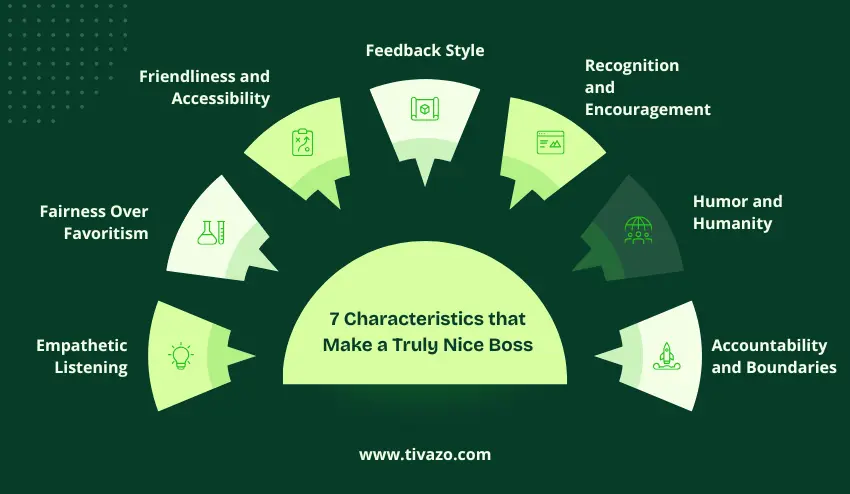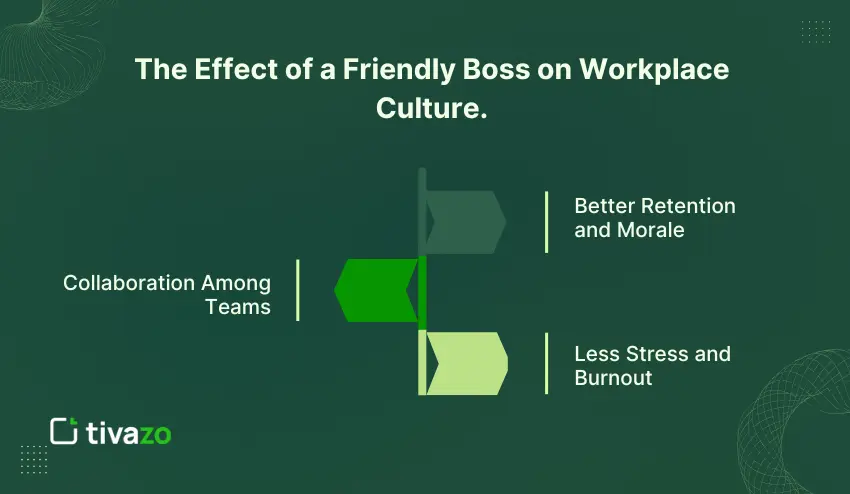The perception of a “boss” has evolved exceedingly. Leadership is no longer about yelling orders, micro-managing, and distinguishing yourself as management or “boss” vs. “staff” or “the worker bees.” Today’s leaders who have the most respect are friendly, not feared.
A friendly boss is more than someone who smiles a lot or tells funny stories in meetings. They lead with empathy, listen intently, and create an environment of trust so people feel good about themselves. It is not niceness. It is emotional intelligence in action in the form of leadership. A study states that when people feel cared for by their boss, they stay 23% longer and are 21% more productive.
In this blog, we will examine what makes a boss truly friendly, what it means to be friendly as a boss, and what friendliness and respect have come to represent as superpowers of 21st-century leadership. In this blog, you will learn the psychology behind friendly leadership, ways to balance being friendly while being the boss, real-life examples of leaders who were able to master friendliness in their leadership style, and action step ideas to incorporate friendliness into your own leadership style.
What Does It Really Mean to Be a Friendly Boss?

While the term “friendly boss” can be interpreted in different ways, it typically signifies a significant change in the leader’s relationship with their teams. A friendly boss leads with warmth, fairness, and genuine concern, and they develop relationships in a way that they can demonstrate respect with their teams while still maintaining appropriate boundaries of professionalism. They show their colleagues that they are being listened to, they are supported, and they are encouraged to be their best.
Being friendly does not mean being best friends with everyone or avoiding conversations that are not always fun. Being friendly means being able to act with respect and kindness, even when making the tough calls. A friendly boss will clarify expectations, give feedback in a constructive way, and interact with their colleagues in collaboration rather than control.
In essence, a friendly boss has a good balance between being approachable and being firm. A friendly boss creates an environment in which employees feel safe to share their own ideas, take ownership of their mistakes, and evolve and grow as professionals. Ultimately, a friendly boss’s friendly nature can be a catalyst for connection that builds accountability and drive for performance.
The Psychology of Friendly Leadership
Friendliness is not simply an aspect of someone’s personal style of leadership; it has a psychological basis. When leaders develop an atmosphere of trust and warmth, they psychologically activate the feelings of trust and motivation amongst members of their team. This sort of psychological safety increases the likelihood that people will speak up, take risks, and put forth their best ideas.
How Friendliness Increases Trust and Loyalty
Of course, employees don’t just follow directions; they follow people they trust. A friendly boss signals reliability because every day their behavior is consistent, they are honest, and they express empathy towards their people. As the Harvard Business Review reported, employees who trust their managers feel more engaged and are 50% more productive.
Trust also increases loyalty. A friendlier manager makes people feel like a person and not just part of a job, which gives me time to contribute more to their success. When employees feel like a person, they stay longer and are more likely to contribute additional effort. Friendliness becomes a business advantage due to the impact it can have on the emotional connection between a leader and their team.
Understanding the Difference Between Friendly and Soft
Many novice leaders are concerned that being friendly will demonstrate weakness, but being friendly and being soft are two different things. A friendly leader shows empathy and respect while creating boundaries. A soft leader avoids tough discussions and struggles with accountability.
The greatest difference is in their intent. Friendly leaders care equally about the person and performance. A friendly leader can provide difficult feedback while raising morale, while a soft leader prioritizes being a likeable leader over a respected leader, but is often fraught with confusion and inconsistency.
A genuinely friendly leader knows that being kind does not equate to being soft. A friendly leader is approachable and also gains respect through fairness, honesty, and reliability. The best leaders prove that both compassion and ability can exist at the same time.
Signs You Are Too Friendly as A Leader
If you constantly say yes to avoid conflict, do not correct someone’s mistakes so as to not hurt their feelings, or let deadlines slip to maintain peace, you may be leaning towards being too soft. Being a leader who is supportive should never mean being soft in structure and accountability.
| Trait | Friendly Leader | Soft Leader |
|---|---|---|
| Communication | Clear and kind | Hesitant and vague |
| Feedback | Honest and helpful | Avoids criticism |
| Decision-making | Confident | Indecisive |
| Boundaries | Respectful and firm | Blurred or inconsistent |
| Team Perception | Trusted and respected | Liked but not taken seriously |
7 Characteristics that Make a Truly Nice Boss
Being friendly as a leader requires more than just a good attitude. It takes emotional awareness, consistency, and an authentic interest in people. Here are 7 characteristics that describe a friendly boss and that make them the type of leader whom everyone wants to work for.

Empathetic Listening
Friendly bosses listen to truly understand, rather than listening to respond. They pay attention to what one of their team members says and what it may feel like to be that team member. Empathy creates trust and tells the employee their voice matters. Even simple habits, like looking someone in the eyes and remembering something they told you previously, can go a long way in establishing this characteristic.
Fairness Over Favoritism
Friendly bosses treat everyone with the same level of respect. When they have to make decisions about work, they are based on who performed best and who conducted themselves with integrity, and not based on who is their personal favorite and bias. Fairness increases credibility, while favoritism quietly fractures a team.
Friendliness and Accessibility
Employees will be more inclined to present ideas and express concerns to their boss if they feel they can be candid, as a friendly boss fosters an open environment for discussion and feedback. As a more approachable leader, they even respond calmly when things go wrong, which is key to preventing small problems from growing into large ones.
Feedback Style
A friendly manager is adept at giving feedback in a way that does not trigger defensiveness or personal feelings, but instead fosters growth. They begin their feedback process by acknowledging the employee’s effort and, as an example, offering the employee clear feedback based on observable actions that facilitate next steps. This balance results in improved morale and enhanced performance, motivating employees to improve their practices without teaching hopelessness.
Recognition and Encouragement
Everyone has a need to feel that someone recognizes their efforts. A friendly boss makes recognition and encouragement a habit. While this may be as simple as a short e-mail acknowledging their efforts to a public thank you at a meeting, recognizing an employee’s effort encourages the employee to continue performing at high quality.
Humor and Humanity
A little laughter in the workplace helps build connection. A good boss knows how to keep a serious situation from getting tense without sacrificing professionalism. Humor disarms the moment, unleashes creativity, and reminds the people involved that even leaders are human.
Accountability and Boundaries
At times, a friendly disposition can be a disadvantage. The very best leaders develop a friendly reputation while still holding themselves and others accountable. They set boundaries, maintain standards, and manage conflict fairly and respectfully. True friendship in leadership is grounded in respect, not laxness.
How to Be a Friendlier Boss (While Still Being in Charge)
Being a friendlier boss doesn’t mean you have to change from who you are today. Rather, it means developing behaviors that let your team know that you care about them, while also enforcing rules and professionalism. The best leaders find the balance between friendliness and accountability.
Begin with Active Listening
It is hard to be friendly if you don’t listen to people. Get into the habit of giving people your undivided attention. Don’t interrupt them, and summarize what they said to show that you understand them. Even this simple act helps build trust and identify small issues before they become big issues.
Be Transparent
Be forthright about your goals, decisions – even mistakes you make. When you share freely and openly, your team will learn to do the same. Transparency builds trust, keeping the lines of communication open. Transparency also keeps speculation and office gossip at bay.
Provide More Positive Feedback
Acknowledging effort outweighs any incentive you can give. Aim for a 3:1 ratio of positive to negative feedback. When someone feels appreciated for their efforts, you will find them to be more willing to respond to constructive feedback. A simple thank you note or “You did awesome” in a meeting can go a long way.
Clarify Expectations
Being kind is most helpful to everyone when they are clear on what success looks like! Be sure to clearly communicate roles, goals, and deadlines. On the front end, being clear on expectations will limit misunderstandings and illustrate that you value accountability as much as approachability.
Get to Know Team Members
Make it a point to inquire about the leisure interests of your colleagues. Ask about how their weekend was! Demonstrating that you give a darn about them as a whole person and not just a team member/employee is very important. Celebrate their birthdays, and check in as they face challenges. All of these little (and personal) gestures are how you create loyalty from your colleagues and create a sense of safety and belonging in the workplace.
The Effect of a Friendly Boss on Workplace Culture.
A friendly boss does much more than foster individual relationships; they influence the culture of the entire workplace. Their style affects the overall morale of the team, collaboration, retention, and even productivity. The impact an effective leader has based on respect and kindness expands throughout the organization.

Better Retention and Morale
Employees who feel appreciated are more likely to remain with a company. Managers who are friendly will increase retention by fostering a workplace atmosphere where people feel valued and respected. Studies have shown that companies with high employee satisfaction will retain employees many times over, sometimes leading to fifty percent lower attrition rates.
Collaboration Among Teams
A friendly boss will encourage open communication, trust, and mutual respect among parties. Teams are more likely to share ideas, assist one another, or recall shared goals to help move the conversation along. This team and collaborative environment usually lead to better and faster solutions to problems.
Less Stress and Burnout
The environment established by friendly leaders engenders emotional safety. Employees will find it easier to open up about challenges that impact their workload or to solicit help if they need it. Stress is alleviated while burnout is proactively avoided, so employees’ overall well-being is supported. Teams managed by empathetic managers generally have enough energy over the long haul and build upon their productivity over a more sustained period.
Common Misconceptions About Friendly Boss
Many people have the notion that a friendly boss is weak or ineffective. The truth is that friendly leadership requires skill, balance, and confidence. By tackling some of the myths, we can better understand what friendliness looks like in the workplace.
Being Friendly Means Being Weak
Some people think that to be kind is to lessen authority. In fact, the reverse is true; friendly bosses earn respect by being empathetic while ensuring accountability. Their teams trust them and respond out of willingness to follow, rather than fear.
You Cannot Be Friends With Employees
Friendliness does not give you a license to breach professional relationships. Leaders can be accessible and personable without losing respect or authority. A friendly boss is aware of when to be supportive and when to uphold rules.
It Only Works in Small Teams
Some people think that friendly leadership motivates only work in small teams. In fact, friends can enhance large organizations too when leaders set the tone for modeling kindness and empathy. A consistent approach towards fairness and recognition can be applied throughout the departments.
Conclusion
The definition of a boss has changed. In the modern workplace, respect, trust, and empathy are far more significant than the role of authority. Friendly bosses create the conditions in which employees feel valued, are physically safe, and are motivated to deliver their best work.
The concept of a friendly boss is not simply about being liked at all costs. It is finding the balance between kindness and accountability, being caring while maintaining the professional work environment, and building relationships that give rise to loyalty and performance. When leaders understand how to establish this balance, their teams are more engaged, collaborative, and successful over the long term.
By placing an emphasis on empathy, recognition, and open communication, anyone in a leadership role could be the type of boss who people respect and follow. The work world is headed in the direction of those who can lead with both skill and caring.




